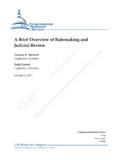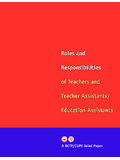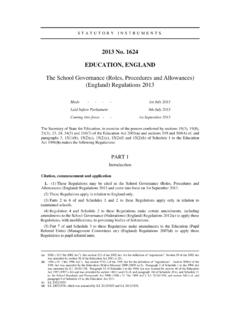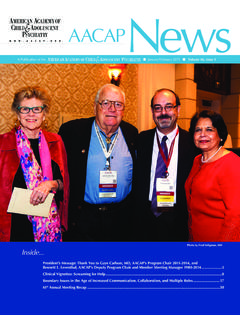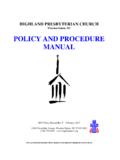Transcription of Roles and Duties of a Member of Congress - wise …
1 CRS Report for CongressPrepared for members and Committees of Congress Roles and Duties of a Member of Congress R. Eric Petersen Specialist in American National Government November 4, 2010 Congressional Research Service7-5700 RL33686 Roles and Duties of a Member of Congress Congressional Research Service Summary The Duties carried out by a Member of Congress are understood to include representation, legislation, and constituent service and education, as well as political and electoral activities. The expectations and Duties of a Member of Congress are extensive, encompassing several Roles that could be full-time jobs by themselves. Despite the acceptance of these Roles and other activities as facets of the Member s job, there is no formal set of requirements or official explanation of what Roles might be played as members carry out the Duties of their offices. In the absence of formal authorities, many of the responsibilities that members of Congress have assumed over the years have evolved from the expectations of members and their constituents.
2 Upon election to Congress , members typically develop approaches to their jobs that serve a wide range of Roles and responsibilities. Given the dynamic nature of the congressional experience, priorities placed on various Member Roles tend to shift in response to changes in seniority, committee assignment, policy focus, district or state priorities, institutional leadership, and electoral pressures. In response, the Roles and specific Duties a Member carries out are often highlighted or de-emphasized accordingly. Although elements of all the Roles described can be found among the Duties performed by any Senator or Representative, the degree to which each is carried out differs among members . Each Member may also emphasize different Duties during different stages of his or her career. With no written requirements, each Member is free to define his or her own job and set his or her own priorities. This report will be updated as warranted. Roles and Duties of a Member of Congress Congressional Research Service Contents Introduction.
3 1 Member and Public Expectations .. 2 Roles of members of Representation .. 5 Legislation .. 6 Constituency 7 Oversight and 8 Advice and Consent (Senators Only) .. 8 Congressional Leadership .. 8 Personal Office Management .. 9 Electoral and Political Activity .. 9 10 Tables Table 1. Roles and Duties of a Member of Congress Identified by members of the House of Representatives .. 3 Table 2. Jobs, Duties , and Functions the Public Expects a Member of Congress to 4 Contacts Author Contact Information ..10 Roles and Duties of a Member of Congress Congressional Research Service 1 Introduction The Constitution establishes qualifications for Representatives and Senators, but it is silent about the Roles and Duties of an individual Member of House and Senate rules require only that members be present and vote on each question placed before their The job of a Member of Congress has been characterized as a license to persuade, connive, hatch ideas, propagandize, assail enemies, vote, build coalitions, shepherd legislation, and in general cut a figure in public affairs.
4 3 Beyond voting requirements, there is no formal set of expectations or official explanation of what Roles or Duties are required, or what different members might emphasize as they carry out their work. In the absence of such formal authorities, many of the responsibilities that members of Congress have assumed over the years have evolved from the expectations of members and their Today, the Roles and Duties carried out by a Member of Congress are understood to include representation, legislation, and constituent service and education, as well as political and electoral activities. In a typical week, members may oversee constituent services in the state or district, travel between their state or district to Washington, DC, to participate in committee activities, greet a local delegation from the home state, meet with lobbyists, supervise office staff, speak on the floor, conduct investigations, interact with the news media, and attend to various electoral Duties , including fundraising, planning, or campaigning for election.
5 Given that no precise definition exists for the role of a Member , upon election to Congress , each new Member is responsible for developing an approach to his or her job that serves a wide range of Roles and responsibilities. One observer of Congress notes that the first job of a Member is to come to grips with the dimensions of [their] role and develop a personal approach to [their] tasks. Given the many challenges, the overall conclusion is readily apparent: the key to effectiveness in Congress is the ability to organize well within a framework of carefully selected priorities. It is not possible, however, to construct a grand master plan such that priorities and the time devoted to each will neatly mesh, for legislative life is subject to sudden and numerous 1 Art. I, Sec. 2 of the Constitution requires that a Member of the House of Representatives be at least 25 years old, a citizen of the United States for at least seven years, and a resident of the state from which they are elected at the time they are elected.
6 Article I, Section 3 requires that a Senator be at least 30 years old, a citizen of the United States for at least nine years, and resident of the state from which they are elected at the time they are elected. 2 House Rule III, sec. (1); Senate Rule VI (2) and Rule XII (1). 3 David R. Mayhew, America s Congress : Actions in the Public Sphere, James Madison Through Newt Gingrich (New Haven, CT: Yale University Press, 2000), p. 9. 4 For general treatments of the work of members of Congress , see Lee H. Hamilton, How Congress Works and Why You Should Care (Bloomington, IN: Indiana University Press, 2004); Roger H. Davidson and Walter J. Oleszek, Congress and its members , 9th ed. (Washington: CQ Press, 2004), pp. 119-150; Steven S. Smith, The American Congress (Boston: Houghton Mifflin Company, 1995), pp. 94-102; Thomas E. Kavanagh, The Two Arenas of Congress , in Joseph Cooper and G. Calvin Mackenzie, eds., The House at Work (Austin: University of Texas Press, 1981), pp.
7 56-77; Lewis Anthony Dexter, The Job of a Congressman, in Raymond E. Wolfinger, ed. Readings on Congress (Englewood Cliffs, NJ: Prentice Hall, Inc., 1971), pp. 69-89; Roger H. Davidson, The Role of a Congressman (New York: Pegasus, 1969); Donald Tacheron and Morris K. Udall, The Job of the Congressman: An Introduction to Service in the House of Representatives (New York: The Bobbs-Merrill Company, Inc., 1966); Charles L. Clapp, The Congressman: His Work as He Sees It (Garden City, NY: Doubleday and Company, Inc., 1964); and Donald R. Matthews, Senators and Their World (New York: Vintage Books, 1960). 5 Gerald D. Sturges, The Freshman Faces Congress , in Sven Groennings and Jonathon P. Hawley, eds., To Be a Congressman: The Promise and the Power (Washington, DC: Acropolis Books, Ltd, 1973) p. 35. Roles and Duties of a Member of Congress Congressional Research Service 2 Observers note that after identifying and organizing priorities, a Member typically carries out some of the resulting Duties personally, and delegates others to congressional staff who act on his or her behalf.
8 The staff may work in the Member s individual office, on committees to which the Member is assigned, in offices connected to leadership posts the Member may hold, and in the separate political and reelection operations the Member may maintain. In this understanding, the Member sets broad policies to fulfill his or her Duties , and the appropriate staff act to carry them The distribution of responsibility will vary according to the preferences and priorities of the Member at the center of the effort. Nevertheless, the work carried out by staff is typically attributed to the effort of the Many scholars of Congress see these Member choices and delegation arrangements as dependent in part on their goals. Generally, these observers suggest that members pursue three primary goals: gaining reelection, securing influence within Congress , and making good public policy. The relative priority a Member may assign to these goals can affect a wide range of choices regarding a congressional career, including (1) the emphasis given to different Roles and Duties ; (2) activities in the Washington, DC, and district or state offices; (3) staffing choices in Member and committee offices; and (4) preference for committee assignments.
9 It can also affect a Member s approaches to legislative work, constituent relations, media relations, party issues, and electoral Given the dynamics of the congressional environment, the priorities that members place on various Roles may change as their seniority increases, or in response to changes in committee assignments, policy focus, district or state priorities, institutional leadership, or electoral pressures. Member and Public Expectations As part of a broader evaluation of House administrative practices in the mid-1970s,9 the House Commission on Administrative Review surveyed members of the House and asked them to 6 For a discussion of staff Roles and Duties , see CRS Report RL34545, Congressional Staff: Duties and Functions of Selected Positions, by R. Eric Petersen; For historical staffing data, see CRS Report R41366, House of Representatives and Senate Staff Levels in Member , Committee, Leadership, and Other Offices, 1977-2010, by R.
10 Eric Petersen and Amber Hope Wilhelm. 7 See Davidson and Oleszek, Congress and its members , pp. 140-145; Robert H. Salisbury and Kenneth A. Shepsle, Congressman as Enterprise, Legislative Studies Quarterly, vol. 6, November 1981, pp. 559-576; and Burdett A. Loomis, The Congressional Office as a Small (?) Business: New members Set Up Shop, Publius, vol. 9, Summer 1979, pp. 35-55. 8 See Gregory J. Wawro, Legislative Entrepreneurship in the House of Representatives (Ann Arbor, MI: University of Michigan Press, 2000); George Serra and David Moon, Casework, Issue Positions, and Voting in Congressional Elections: A District Analysis, The Journal of Politics, vol. 56, Feb., 1994, pp. 200-213; R. Douglas Arnold, The Logic of Congressional Action (New Haven, CT: Yale University Press, 1990); Morris P. Fiorina, Congress , Keystone of the Washington Establishment, 2nd ed. (New Haven, CT: Yale University Press, 1989); Bruce Cain, John Ferejohn, and Morris Fiorina, The Personal Vote: Constituency Service and Electoral Independence (Cambridge, MA: The Harvard University Press, 1987); John R.

